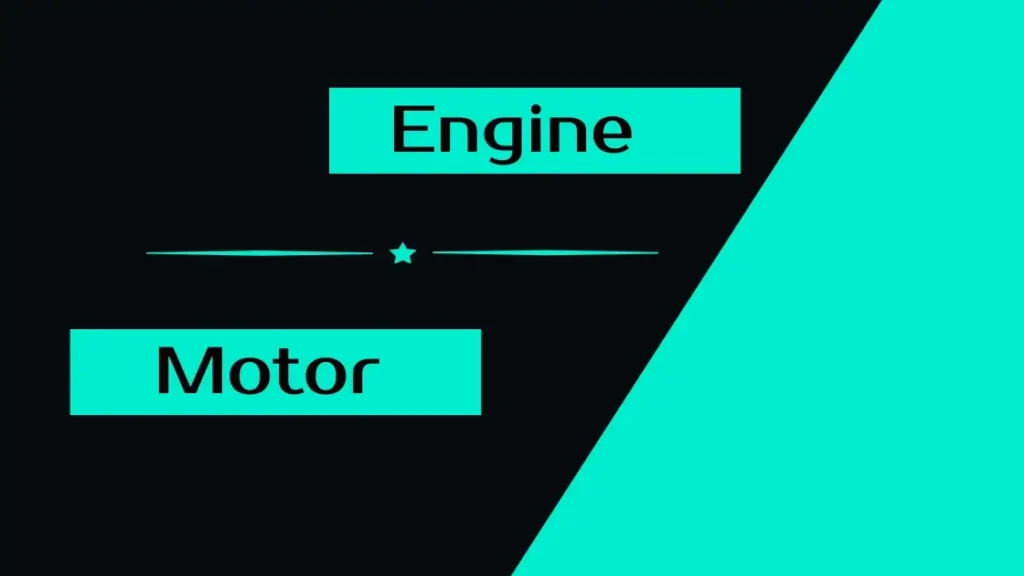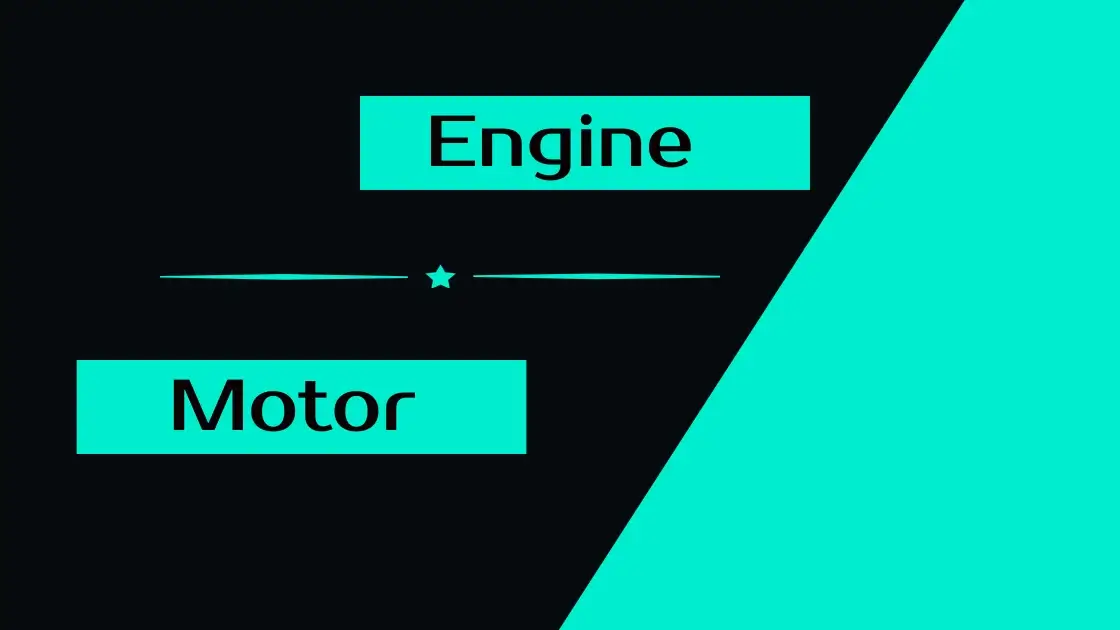Engines and motors are words we hear often, but what exactly do they mean and what sets them apart? This article will provide a deep dive into the difference between an engine and a motor, two similar yet distinct power machines. After reading, you’ll have a clear understanding of what makes each unique.
To kick things off, let’s clarify the basic definitions. An engine is a mechanical device that converts power into motion. It supplies motive power for a vehicle or device. The most common example is the internal combustion engine, which burns fuel to generate force through pistons and cylinders.
Comparatively, a motor is a device that converts electrical energy into mechanical energy. Motors require an external power source like electricity, whereas engines often generate their own power internally through combustion. Motors are used in everything from small appliances to automobiles.
Now that we’ve covered the textbook meanings, let’s explore about the difference between an engine and a motor in more detail:
What Are the Main Types of Engines and Motors?
There are several major types of engines, including:
- Internal combustion engines – These engines convert chemical energy from fuel into mechanical work. Gasoline and diesel engines used in most vehicles are internal combustion engines.
- External combustion engines – Steam engines are a common example, where combustion takes place separately from the part that converts energy into motion.
- Electrical engines – These engines use electrical energy as the input to produce mechanical output.
Some common types of motors include:
- DC motors – Powered by direct current electricity, these are used in tools, appliances, toys and more.
- AC motors – Running on alternating current, AC motors power objects from industrial machines to home appliances.
- Stepper motors – These motors move in precise increments and are often used in 3D printers, CNC machines and more.
- Servomotors – Used when precise motion and position control are needed, servomotors are common in robots and radio-controlled vehicles.
So in summary, while engines often generate power internally, motors require an external power source to operate. Engines convert various forms of energy into motion, while motors specifically convert electrical energy.
What’s the difference between an engine and a motor?
This is a common source of confusion, so let’s clarify. An electric motor converts electrical energy into mechanical power. It uses electromagnetic induction to create motion. Electric motors are used in everything from electric cars to home appliances.
An engine refers to any mechanical device that produces power. So while an electric motor is an engine in the broad sense, most people use the term “engine” to refer specifically to internal combustion engines. These engines use pistons, cylinders and ignition of fuel to generate power.
So in everyday usage, an “electric motor” refers to a device powered by electricity, while an “engine” implies an internal combustion powerplant. But technically, electric motors are engines since they produce power and motion.
How Do Pistons, Cylinders and Other Parts Differ Between Motors and Engines?
The internal combustion engines used in most vehicles have pistons, cylinders, valves, crankshafts and other moving parts. The controlled burning of fuel pushes the pistons down the cylinders, driving the motion of the crankshaft and wheels.
Comparatively, electric motors consist of a stator (stationary electromagnets) and a rotor (rotating electromagnets) along with an axle. When electricity is applied, it generates a magnetic field which causes the rotor to spin. This rotary motion can then be used to power wheels or other mechanical devices.
So in summary, engines often have many more moving parts, while motors have no need for cylinders, pistons and complicated valve timing. The electromagnetic field in a motor creates spin and motion more simply.
What Are Some Examples of Engines and Motors in Everyday Life?
Engines and motors power many of the machines we rely on daily, often without realizing it. Here are just a few examples:
- The gas or diesel engine in your car
- The outboard motor on a boat
- The subway powered by electric motors
- The starter motor that cranks your engine when you turn the key
- The fan motors cooling the refrigerator and AC
- The tiny servo motors directing the lens in your camera
- The turbines generating electricity in power plants
So in our everyday lives, we encounter and depend on motors and engines constantly. Engines provide power and motion in vehicles and generators, while versatile electric motors run our appliances, tools and toys.

Historical Perspective: How Did These Terms Originate and Evolve?
The word “engine” derives from the Latin word ingenium, meaning “ingenuity”. Early engines were simple machines like catapults and pulleys. But as technology advanced, the word “engine” became associated with more complex power devices.
“Motor” comes from the Latin word motare, meaning to set in motion. Early motor examples were water wheels, windmills and horse treadmills supplying motive force. But the term became closely tied to electric motors when they were developed in the 1800s.
So the historical roots of these words – “ingenuity” and “motion” – help explain how engines and motors came to represent the machines driving progress and innovation through the generation of power. Their meanings evolved along with technological advances.
Key Takeaways: The Main Differences Summarized
Let’s recap the key differences:
- An engine is a machine that converts power into mechanical force and motion. Engines often generate their own power.
- A motor converts electrical energy into mechanical motion. Motors require an external power source to operate.
- Internal combustion engines like those in cars have many more moving parts than electric motors.
- While technically electric motors are a type of engine, in common usage “motor” refers to electric power while “engine” refers to internal combustion.
So in summary, engines and motors are similar in that they both supply power and motion. But key differences lie in their power sources and inner workings. By understanding these distinctions, you’ll have a clear picture of what sets engines and motors apart!
FAQ’s
What is the difference between an engine and a motor?
An engine and a motor are often used interchangeably, but there is a slight difference. Generally, an engine is a device that converts a form of energy into mechanical motion, while a motor is a machine with moving parts that converts power into motion.
Can you explain the differences between a motor and an engine?
The main difference between a motor and an engine is their mechanism. A motor is a machine with moving parts that converts power into motion, whereas an engine is a device that converts a form of energy into mechanical motion.
What is an internal combustion engine?
An internal combustion engine is a type of engine that involves the combustion (burning) of a fuel source within the engine itself to generate power and produce mechanical motion.
What is the difference between an engine and a motorboat?
A motorboat usually refers to a watercraft with an engine that powers the boat, while an engine is the mechanical device that converts energy into mechanical motion, which can be used in various applications.
What is the difference between a motor and an induction motor?
An induction motor is a type of motor that operates on the principle of electromagnetic induction. While all induction motors are motors, not all motors are induction motors. The term “motor” is a broader category that encompasses various types of machines with moving parts.
What does it mean when someone refers to an engine?
Referring to something as an engine usually implies that it is a device that converts a form of energy into mechanical motion. For example, when we hear the word “engine,” we often think of a combustion engine found in vehicles.
Can you explain the difference between an engine and a search engine?
The term “engine” has different meanings depending on the context. An engine, in the context of machines, refers to a device that converts energy into mechanical motion. On the other hand, a search engine is a specialized software program that searches and retrieves information from an external source, typically the internet.
What is the difference between an engine and an electric motor?
The main difference between an engine and an electric motor lies in the type of energy they use. An engine typically operates on a fuel source, such as gasoline or diesel, while an electric motor uses electricity to generate mechanical motion.
What is the significance of the word "engine" in everyday language?
The word “engine” has become a metaphorical term used to describe a device or system that drives or powers something. For example, when we refer to someone as the “engine” behind a project, we mean that they are the driving force behind its success.
How has the meaning of the word "engine" evolved over time?
The word “engine” has a rich history and its meaning has evolved over time. Originally, it referred to a machine with moving parts that converted power into motion. However, with advancements in technology, the term has expanded to include various types of machines and systems that perform specific tasks, such as search engines or game engines.
